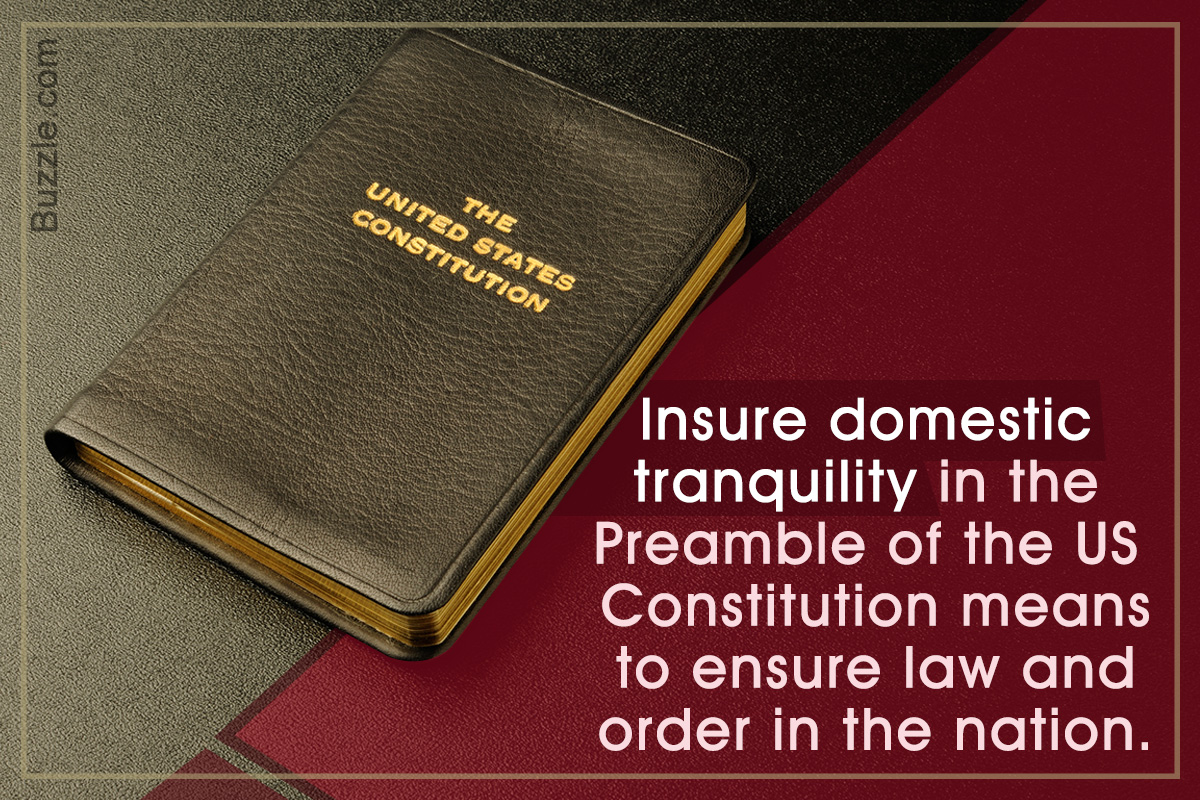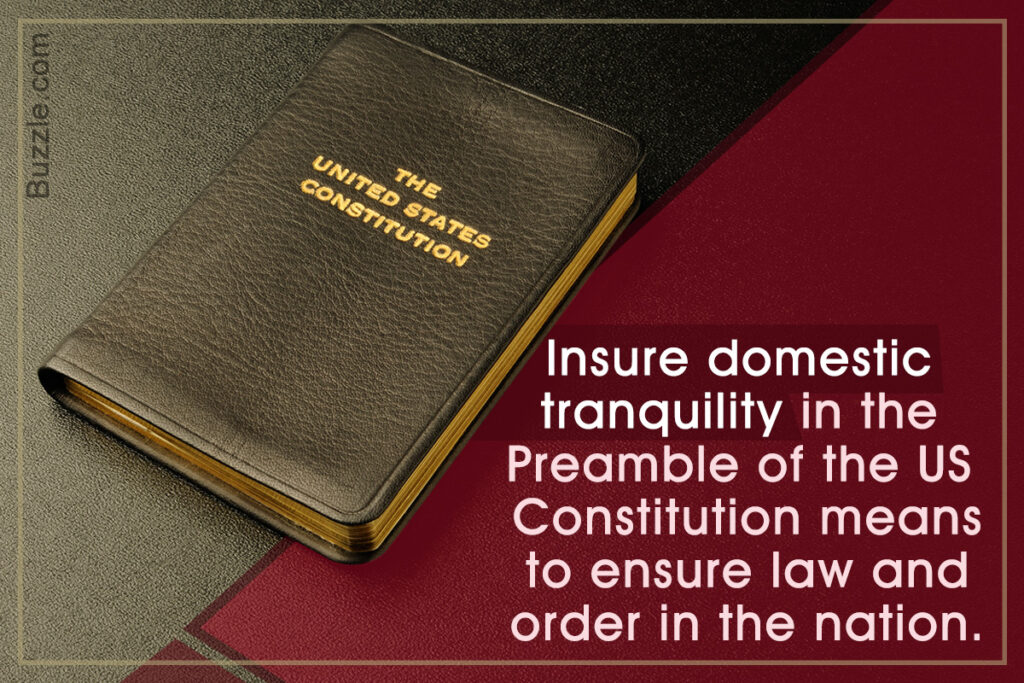Domestic Tranquility and its Constitutional Context
Domestic tranquility is a fundamental principle enshrined in the Preamble of the United States Constitution, which states that one of the primary purposes of the government is to “insure domestic Tranquility.”
This principle is rooted in the historical and political context of the United States’ founding. The colonies had recently fought a war for independence against Great Britain, and the new nation was still struggling to establish a stable and unified government. The inclusion of domestic tranquility in the Preamble reflected the desire of the framers to create a government that could protect its citizens from internal strife and promote a sense of peace and order.
Government’s Interpretation and Actions
Throughout history, the government has interpreted and acted upon the principle of domestic tranquility in various ways. For example, the government has used its authority to:
- Enforce laws and maintain order within the country.
- Respond to civil unrest and quell insurrections.
- Protect citizens from foreign and domestic threats.
- Promote economic stability and prosperity, which are essential for maintaining domestic tranquility.
Ensuring Domestic Tranquility through Law Enforcement
Maintaining domestic tranquility is a fundamental objective of any nation, and law enforcement agencies play a crucial role in achieving this goal. Through their mandate to uphold the law and preserve order, they help prevent violence, protect individual rights, and foster a sense of security within communities.
The effectiveness of law enforcement in ensuring domestic tranquility relies heavily on the legal and ethical frameworks that guide their actions. Laws provide the legal basis for enforcement, defining prohibited conduct and establishing penalties for violations. Ethical considerations, on the other hand, ensure that law enforcement is carried out fairly, impartially, and with respect for human rights.
Balance between Public Safety and Individual Rights
Striking the right balance between public safety and individual rights is a constant challenge in law enforcement. While maintaining order and preventing violence are essential for a peaceful society, it is equally important to safeguard the rights of individuals, including their privacy, freedom of expression, and due process of law.
Law enforcement agencies must adopt practices that minimize the infringement of individual rights while effectively addressing threats to public safety. This requires ongoing training, supervision, and accountability mechanisms to ensure that officers act within the bounds of the law and respect the rights of those they encounter.
Promoting Social and Economic Stability
Domestic tranquility depends heavily on the stability of society and its economy. Social and economic conditions have a profound impact on the well-being of citizens and their ability to live in harmony. Addressing social and economic inequalities and promoting economic well-being are crucial for maintaining domestic peace.
Government Policies and Programs
Governments play a significant role in promoting social and economic stability. They implement policies and programs aimed at:
- Reducing poverty and inequality
- Providing access to education, healthcare, and other essential services
- Encouraging economic growth and job creation
- Investing in infrastructure and public works
- Supporting vulnerable populations, such as the elderly, disabled, and unemployed
Economic Well-being and Domestic Peace
Economic well-being is closely tied to the maintenance of a peaceful society. When individuals have access to basic necessities, job opportunities, and a sense of economic security, they are less likely to engage in conflict or disruptive behavior. Economic disparities, on the other hand, can lead to resentment, social unrest, and even violence.
By promoting social and economic stability, governments create a more conducive environment for domestic tranquility. When citizens feel that their needs are being met and that they have a stake in the future, they are more likely to be invested in the well-being of their communities and the nation as a whole.
Addressing Internal Threats to Tranquility

Maintaining domestic tranquility is a crucial responsibility for any government. Internal threats, such as civil unrest, political extremism, and terrorism, can destabilize a nation and undermine its peace and security. To effectively address these threats, governments employ a range of strategies and mechanisms.
Civil Unrest
Civil unrest encompasses a wide spectrum of activities, from peaceful protests to violent riots. Governments typically respond to civil unrest by employing law enforcement agencies to maintain order and protect public safety. Additionally, governments may engage in dialogue with protest leaders to address grievances and find peaceful solutions.
Political Extremism
Political extremism poses a threat to domestic tranquility when it incites violence or undermines the rule of law. Governments may counter political extremism through measures such as monitoring extremist groups, enforcing laws against hate speech, and providing support for deradicalization programs.
Terrorism
Terrorism, defined as the use of violence or the threat of violence to achieve political or ideological goals, is a grave threat to domestic tranquility. Governments combat terrorism through intelligence gathering, law enforcement, and international cooperation. Anti-terrorism measures aim to prevent terrorist attacks, disrupt terrorist networks, and prosecute those responsible for terrorist activities.
International Cooperation and Diplomacy
International cooperation and diplomacy play a crucial role in fostering domestic tranquility. By engaging with other nations, countries can build partnerships, resolve conflicts peacefully, and promote global stability.
Foreign policy decisions can significantly impact domestic stability. For instance, decisions regarding trade agreements, military alliances, and diplomatic relations with other countries can influence economic prosperity, national security, and social harmony within a nation.
International Agreements and Organizations
Numerous international agreements and organizations contribute to global peace and security. These include:
- United Nations (UN): A global organization dedicated to maintaining international peace and security, promoting human rights, and fostering economic and social development.
- North Atlantic Treaty Organization (NATO): A military alliance that provides collective security to its member states.
- Organization for Security and Co-operation in Europe (OSCE): An organization that promotes security, democracy, and human rights in Europe.
- International Criminal Court (ICC): A court that prosecutes individuals for serious international crimes such as genocide, war crimes, and crimes against humanity.







